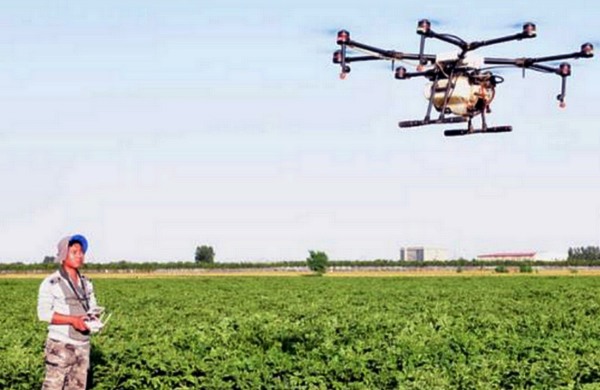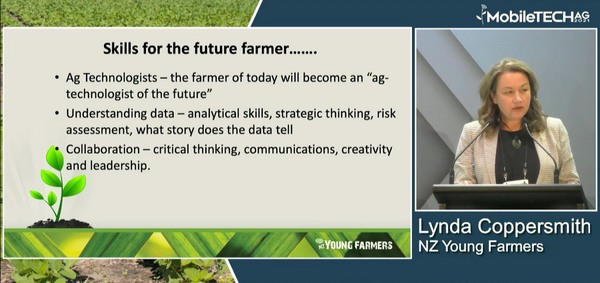Young people entering today's farming industry need to have an understanding of technology and science and be open to embracing innovation and change, according to the New Zealand industry body NZ Young Farmers (NZYF).
Chief Executive Officer Lynda Coppersmith told the MobileTECH Ag conference in Rotorua that gone are the days where farming was based only on practical skills, rather it takes a lot more business skills than ever before.
"More recently farming has evolved to have much more of a business focus, where farmers need to be viable and profitable in order to be sustainable financially," Ms Coppersmith said. "That's never going to change, as far as I can see. Traditional farming skillsets have been predominantly around practical capabilities such as fencing and growing crops. Over the past few years, the skillset required has gradually expanded as farm owners have taken much more of a business and compliance focus. Skills in running a profitable and viable business have become more important, especially when we went through deregulation in the 1980s and no longer can farmers run an unprofitable business."
NZYF is around 100 years old as an organisation and has a network of 80 clubs across the country, with a vision of creating success for young people in the food and fibre sector, and retaining the enthusiasm within the sector.

Ms Coppersmith says another important balance within the primary industries sector is between feeding the country and looking after the planet.
"It has almost got to the point where farmers have become ag technologists," she said. "They will have to understand how robotics work, artificial intelligence (AI), drones, sensors, 3D printing, virtual and augmented reality, blockchain and the internet of things (IoT) - all that farmers 50-60 years ago wouldn't even have imagined. They need to understand data; all of this technology is providing them with a wealth of data. So, they almost have to become data analysts. They need to be able to understand the story of what the data is telling about their business and how they can make better strategic decisions and understand risks by using the data. While the one area that is most outside the comfort zone for our current farmers is collaboration."
Some of the main drivers in adopting more technology, such as data ecosystems, robotics, AI into the agriculture industry include labour shortages, the impacts of climate change and the increasing demand for food as the population grows. Ms Coppersmith added that farmers need to work in an interdependent system focused on good relationships, involving communication skills and critical thinking and good leadership. But it is not a complete shift away from the required skillset, rather a broadening of skills.
"Farmers of the future will still need to do some of the 'old-school' farming things, but they will also be able to understand and access the (modern-day) skills," Ms Coppersmith said. "So, a person coming into the sector can have the best technical and scientific skills but if they don't have practical experience around farming, they will still struggle. So, to take advantage of new innovations farmers may have to rely on workers and consultants with good technical and scientific abilities. But the result will be better decision making and they will be able to overcome many of their issues."

While there needs to be a shift in technology values, there also needs to be a shift in leadership values, as 'Generation Z' begin to take up farming roles. Ms Coppersmith says that new farmers have to learn the "soft skills" of leadership.
"It is our view at NZYF that we should be working on the mindset of our future leaders; this will make sure that when they enter senior management positions, they are equipped with resilience, communication skills, self-leadership and emotional intelligence," she said. "They (Gen Z) require different leadership. They want to collaborate - so, the command and control leadership doesn't work with them. They expect respect and don't necessarily believe they have to earn it. They are entrepreneurial and innovative and they don't want to be constrained by rules and bureaucracy - or know their place in the organisation. If we don't teach our current and future farmers how to lead and motivate this generation, we will continue to have the lowest retention rates by sector in New Zealand."
NZ Young Farmers has been running a Young Farmer of the Year for the past 50 years, with the only exception in 2020 due to the COVID-19 pandemic. Ms Coppersmith says it is important to bridge the gap between people with traditional farming backgrounds and those with technological expertise.
"We see a need to still scale up delivery of the traditional skills, but we want to see the adoption of new technology by our members who are the farmers of the future," Ms Coppersmith said. "The good news is that mostly all young people entering the sector are 'technology natives. I think that future farmers will require a wide breadth of skills; you can't get away from the traditional skill set that needs to come through, but it will need to become broader. It is more important than ever to get more young people from non-farming backgrounds with the right skills in technology and science and teach them about farming and vice versa."
MobileTECH Ag is an annual event showcasing the digital technologies transforming the agricultural and horticultural sectors. This year it was held live in person and virtually for those who could not get to Rotorua due to travel restrictions.
For more information
Lynda Coppersmith
NZ Young Farmers
Phone: +64 3 344 2473.
info@youngfarmers.co.nz
www.youngfarmers.co.nz
